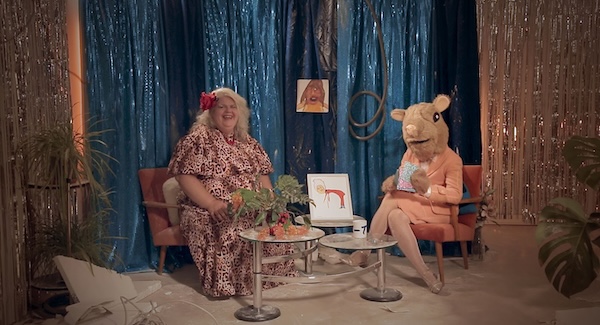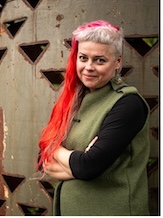Keynote Speakers
Confirmed keynote presentations at the ALTER conference
Cordula Thym and Eva Egermann, University of Vienna
C-TV (If I Tell You I Like You...)
Justin J.W. Powell, University of Luxembourg
Transformation(s)? De-Institutionalization Dynamics in Disability Rights, Representations, and Research
Katerina Kolarova, Charles University (Prague)
Rehabilitative Postsocialism: Disability, Sex, and Race in Eastern Europe
See details below
C-TV (If I Tell You I Like You...) by Cordula Thym and Eva Egermann (Vienna)

Photo: www.sixpackfilm.com
|
C-TV is an award-winning film that uses satire to critique ableist and heteronormative dynamics in society. It depicts a fictional television station and its interviews with people with disabilities about their daily lives and their artistic and political work. Directors Egermann and Thym portray a world in which participation, inclusion, agency, and visibility are realized far more strongly than in our current world. Their film is playful, humorous, and experimental.
The film C-TV is recognised as cutting-edge radical critique and excellent cinema, having been awarded the Diagonale Prize for Innovative Cinema in 2023 and the Golden Medusa for the queerest aesthetic work in 2023.
ALTER is pleased to screen the film and host a Q&A session with its directors.
- Film (with English subtitles): C-TV, 2023, Austria, 30 minutes.
- Discussion with directors:
|
Justin J.W. Powell, University of Luxembourg
|

|
|
Transformation(s)? De-Institutionalization Dynamics in Disability Rights, Representations, and Research
Taking up the conference theme of ‘Transformations’, this keynote examines dynamics of change in disability rights, representations, and research—and theorizes (de-)institutionalization dynamics in ideas, norms, and policies. Case studies of disability rights, representations of disability and accessibility, and international disability studies exemplify the complexities, paradoxes, and potentials involved in (attempting to) transform societies to be more inclusive. First, on-going struggles globally to implement the UN-CRPD and SDGs highlight the challenges and disparities in achieving these rights across different world regions. Segregated learning environments persistently expand despite the rise of inclusion, and disability, equity, and inclusion (DEI) programs in higher education are both threatened and strengthened. Second, the diversity inherent in representing dis/ability will be exemplified through the global diffusion of the international symbol of access. Third, adopting global and intercultural perspectives in future research and leveraging spatial and temporal comparisons is necessary to fully understand the dynamics of (de-)institutionalization. Disability research facilitates social change as it contributes to our understanding of transformations, also within the European disability research community.
Keywords: (de-)institutionalization, disability rights, UNCRPD, inclusive education, access symbol, disability research, global perspectives
|
Katerina Kolarova, Charles University (Prague)
|

|
|
Kateřina Kolářová teaches at the Faculty of Humanities, Charles University. She has long been studying social imaginaries of otherness and social attitudes towards "disability", mechanisms of exclusion, feminism, and queer/LGBT* identities. Her recent work explores the bio-social dimensions of metabolism, relationship between human and non human lives, ecological dimensions of digestion and how we coexist with microorganisms, toxic chemicals, and other "unclean" elements/entities. She is undertaking a research into HIV/AIDS and politics of collective immunity/susceptibility to viral threats. In collaboration with Eva Kot'atková and the Institute of Anxiety, she prepared podcast Studio Dysfunction: On the lives of people with "otherness" in a "normal" world (Studio Porucha 2023-2024), http://institutuzkosti.cz/…=cz
|
|
She also collaborated with Meetfactory, Display, and DOX galleries (co-curator of the exhibition Disabled by Normality, 2013)
Her forthcoming monograph Rehabilitative Postsocialism (Michigan University Press, 2025) explores postsocialist transformation and its effects on the so-called minorities and social imaginaries of civil society. She is the editor (with Martina Winkler, Uni Kiel) of a book that traces state policies towards people with disabilities under state socialism - Re/imaginations of Disability in State Socialism: Visions, Promises, Frustrations (Campus Verlag/Chicago University Press, 2021). She is also the author of the anthology Otherness-Disability-Criticism: Social Constructions of Disability and Disability (Postižení-Jinakost-Kritika, 2012).
Further publications:
Kolářová, K. 2023. “Crip Genealogies from the Postsocialist East”, Pp. 217-238 in M. Chen, A. Kafer, E. Kim, and J. A. Minich (eds.). Crip Genealogies. Durham: Duke University Press.
Kolářová, K. 2021. “Sesterství, navzdory: Radikální outsiderství Audre Lorde (Předmluva)“, pp. 4-15 In A. Lorde, Sister Outsider: Eseje a projevy. Překlad Markéta Musilová. Praha: Tranzit.cz.
Kolářová, K., T. Stöckelová, L. Senft. 2022. “Disability and the (Dysbiotic) Gut: Sensing, Tasting and Knowing with Food”. Sociology of Health & Illness, November 25, ahead of print; DOI: 10.1111/1467-9566.13584;
Stöckelová, T., L. Senft, K. Kolářová. 2022. “Sympoietic Growth: Living and Thinking with Fungi in Times of Ecological Distress.” Agriculture and Human Values, https://doi.org/10.1007/s10460-022-10366-7
|
|




